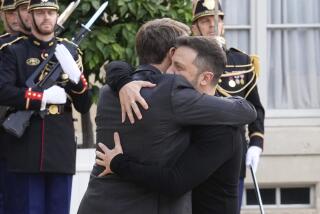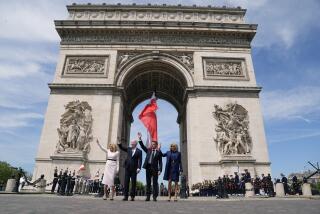As France takes the reins on Libya, Sarkozy triumphs
- Share via
Reporting from Paris — With his popularity at a record low and facing an election next year, French President Nicolas Sarkozy was in desperate need of a boost to his political stature.
And on Saturday, he got it.
The French leader, once dubbed Super Sarko by the local press for his eagerness to take the reins in global crises, summoned leaders from four continents to an emergency war council at the Elysee presidential palace in Paris to agree on military action against strongman Moammar Kadafi in Libya.
His 20 guests had barely reached an agreement when Sarkozy announced that French planes were already in the air preparing to strike.
With almost theatrical gravitas, Sarkozy said France had “decided to assume its role, its role before history” in stopping Kadafi’s “killing spree” against people whose only crime was to seek to “liberate themselves from servitude.”
Barely more than three years ago, Sarkozy gave Kadafi the red carpet treatment in Paris, welcoming him with open arms and allowing the Libyan leader to pitch a Bedouin tent near the Elysee. Now the French president was announcing that he was sending warplanes in to bomb him.
Beside Sarkozy was British Prime Minister David Cameron, France’s partner in the military offensive, talking tough but overshadowed by his Gallic counterpart. Angela Merkel, the German chancellor, had refused to support airstrikes or a no-fly zone and said her country would not take part in the military operation.
Then there was Secretary of State Hillary Rodham Clinton; European leaders and diplomats have been puzzled about America’s apparent unwillingness to take a higher-profile role and, while seated next to French Prime Minister Francois Fillon and opposite Cameron at the summit lunch, Clinton did not seem eager to push herself to the front.
Earlier in the week, French papers reported that when Sarkozy asked Clinton to come out more forcefully in favor of action in Libya, she replied, “There are difficulties” and refused to be drawn out further.
“Frankly, we are completely puzzled,” a French diplomat told one of his European counterparts. “We are wondering if Libya is a priority for the United States.”
In fact, the Obama administration had been reluctant to get involved, fearing another open-ended military mission. But it also worried, as Clinton put it Saturday, that Kadafi, back in power, could revert to supporting terrorism or even try to restart his programs to develop weapons of mass destruction.
So the U.S. signed on to the “time-limited” mission, with the caveat that European and Arab governments would take the lead.
Of course, the French have themselves been criticized for their muted response to the democratic uprisings in the Arab world, particularly in Tunisia, where France’s cozy relations with the former government made it slow to support the demonstrations. In fact, on a visit to Tunis, the capital, three years earlier, Sarkozy had praised the nation’s fight against terrorism and declared civil liberties to be expanding.
Having misplayed Tunisia, and taken a back seat in Egypt, Sarkozy was determined not to be relegated to the sidelines over Libya.
For at least two weeks, he has been agitating for some kind of military action to be taken against Kadafi and had turned to Britain as his ally in this quest, after irritating Merkel and other European leaders with what was seen as French grandstanding.
Ten days ago, European leaders and foreign ministers were reportedly furious after Sarkozy announced that France was recognizing the Libyan opposition, the first country to do so, just 24 hours before a summit to discuss the crisis.
At one point last week it was reported that Sarkozy was prepared to go it alone over Libya, with or without a United Nations resolution. But he apparently thought better of it.
After the Paris summit Saturday, Yves Leterme, the Belgian prime minister, made it clear who was running the Libyan offensive, telling journalists that France was “heading” the military operation.
For France, Libya is important, partly because it shares a border with four French-speaking countries strategic to France: Tunisia, Algeria, Chad and Niger. France also imports oil from Libya, and the French oil giant Total controls an important Libyan oil field.
For Sarkozy, though, Libya offers something else: an opportunity.
He’ll be up for reelection in 2012, and the French appreciate nothing more than a president who puts them on the world stage and embodies what Charles de Gaulle once famously called “a certain idea of France” as a nation of exceptional destiny.
“If all goes well,” a diplomat told Le Parisien newspaper, “it will be a great victory and show he is the man to have in a crisis.”
Willsher is a special correspondent. Times staff writer Paul Richter in Washington contributed to this report.
More to Read
Sign up for Essential California
The most important California stories and recommendations in your inbox every morning.
You may occasionally receive promotional content from the Los Angeles Times.













